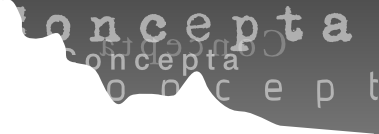History
The status of Concepta reflects discussions held during a period of several years with prominent scholars involved in the training of conceptual historians. The following persons have taken part in these discussions: Pim den Boer, Martin J. Burke, Max Edling, João Feres Júnior, Peter Hallberg, Jan Ifversen, Jussi Kurunmäki, Kari Palonen, Henrik Stenius and Björn Wittrock.
Concepta Board
The first Concepta board was set up in 2006 and was approved by the executive committee of the History of Political and Social Concepts Group (HPSCG) in Uppsala later the same year. The Concepta board had its first face to face meeting at the Finnish Institute for Classical Studies, Villa Lante in Rome in February 2007.
Download the minutes of the board's meeting in Rome in February 2007.
Download the minutes of the board's meeting in Copenhagen April 2008.
Concepta’s Research Training Seminars
Concepta’s first Research Training Seminar was organised in Odense, Denmark in co-operation with the University of Southern Denmark and the Danish Research School for History on 24-25 April 2008. After Odense Concepta has organised Reasearch Training Seminars in Madrid, Stockholm, Oslo, Jyväskylä and Budapest.
See the section "All events" for more information on the Research Training Seminars.
Concepta’s Introductory Courses in Conceptual History
Concepta organised an “Introduction to Conceptual History” summer school in Helsinki in August 2005, 2006 and 2007 in co-operation with the Helsinki Summer School; Centre for Nordic Studies (CENS), University of Helsinki; Centre of Excellence in Political Thought and Conceptual Change, University of Jyväskylä; Danish Research School for History; VAKAVA, National Graduate School for Political Science and International Relations and POLITU, Finnish Political Science Doctoral School.
A group of internationally distinguished scholars has provided the participants with the means to re-examine common concepts in the humanities and social sciences from new perspectives. The emphasis of the intensive, introductory course has been two-fold. First the general premises and practises of conceptual history have been introduced to the participants to enable them to use these methods in their own subsequent research. Second contemporary trends in conceptual history have been explored by means of case studies.
The courses have been conducted through a series of lectures, a seminar and workshops; and they have been designed for Ph.D. and advanced M.A. students from various academic backgrounds. Martin J. Burke (The City University of New York), Jan Ifversen (Aarhus University), Pim den Boer (University of Amsterdam), João Feres Jr. (Instituto Universitarío de Pesquisas do Rio de Janeiro- IUPERJ), Kari Palonen (University of Jyväskylä) and Henrik Stenius (University of Helsinki) have formed the core of the teaching staff.
A number of distinguished scholars such as Risto Alapuro (University of Helsinki), Hans Erich Bödeker (Max Planck Institut für Wissenschaftsgeschichte), Matti Hyvärinen (University of Tampere), Pasi Ihalainen (University of Jyväskylä), Eira Juntti (Temple University, Philadelphia), Pauli Kettunen (University of Helsinki), Petri Koikkalainen (University of Lapland), Jörn Leonhard (University of Freiburg), Pia Letto-Vanamo (University of Helsinki), Tuija Parvikko (University of Jyväskylä), Markku Peltonen (University of Helsinki), Suvi Soininen (University of Jyväskylä), Keith Tribe (University of Sussex) and Tuula Vaarakallio (University of Jyväskylä) have given lectures at the course. In addition Ph.D. Candidates Dimitris Efthimiou, Gabriel Entin, Tero Erkkilä, Terhi Lehtinen, Anthoula Malkopoulou, Jeppe Nevers, Evgeny Roshchin and Sami Syrjämäki have presented their research at the Contemporary Trends in Conceptual History seminar.
The three Concepta summer schools and the two Contemporary Trends in Conceptual History seminars have attracted a wide audience. Students and scholars from the universities in Finland and from Argentina, Australia, Bolivia, Brazil, China, Costa Rica, Denmark, Ecuador, Great-Britain, Greece, Germany, Hungary, Israel, Mexico, the Netherlands, New Zealand, Norway, Poland, Romania, Russia and South Korea have taken part in the summer school and the seminar. After the success of the three previous years’ Concepta will organise the fourth “Introduction to Conceptual History” summer school in Helsinki in August 2008.

